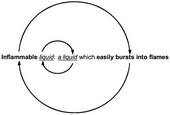Definitional fallacies
 From RationalWiki - Reading time: 5 min
From RationalWiki - Reading time: 5 min
| Cogito ergo sum Logic and rhetoric |
| Key articles |
| General logic |
| Bad logic |
Definitional fallacies are logical fallacies that occur when some definition fails to properly explain some term.
Definitional fallacies are fallacies of ambiguity and informal fallacies.
Circularity[edit]
If a term is defined by itself, the definition carries no new information.
Too broad[edit]
The fallacy of "too broad", or "discarded differentia", occurs if when defining a term, instances are included that aren't usually called by that term.
For example:
- A fish is an aquatic vertebrate.
This definition would include animals like whales and turtles, which are not fish, so the definition needs to be refined:
- A fish is a cold-blooded aquatic vertebrate with two sets of paired fins that is covered with scales.
This definition now excludes those animals that wouldn't be considered fish.
Too Narrow[edit]
The fallacy of "too narrow" occurs if when defining a term, instances aren't included that are usually called by that term.
For example:
- A rectangle is an object with four perpendicular sides of equal length.
This would exclude all rectangles that aren't square. Instead, rectangle must be defined as:
- A rectangle is an object with four sides, each one perpendicular to its adjoining sides.
Ambiguity[edit]
A term is ambiguous if it's unclear what it means.
External Links[edit]
- Too Broad, Stephen Downes
- Too Narrow, Stephen's Guide
 KSF
KSF